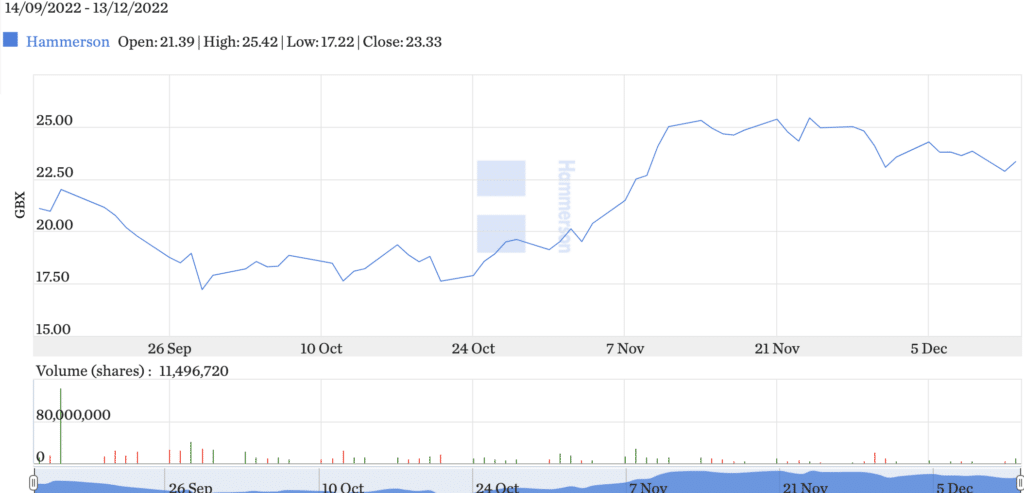This is a very strange idea but one that needs serious consideration – could inflation save the British commercial property companies like Hammerson (LON: HMSO) and Land Securities (LON: LAND)? It’s too late for poor old Intu (the property company, not the software one) but is there this – however weird the idea is – deus ex machina that will save the sector? Possibly, yes, and it requires a careful balancing of likely futures to see how it might work out.
Note, as ever, that this is not a recommendation for a trade. It is, instead, a way of thinking about possible trades.

So, start at the beginning. The British commercial property space works on the idea that retail and office space only ever goes up in value – whether capital or rental. Lockdown and the rise of work from home, lockdown and the rise of internet shopping have rather killed that idea. But that earlier thought did mean that the property companies geared up – they borrowed money. As those capital values come down, along with the rent rolls, it’s therefore possible for the retained equity to be worth less than the debt burden. That is what happened to Intu after all. LandSec and HMSO are both hugely down from former peaks on the same sort of worries.

OK, we don’t expect either rents or capital values to rise all that much as we don’t tend to think that the WFH and internet shopping ideas are going to go away. Well, actually, we might assume there will be a reversal a bit. Internet sales as a portion of all retail have fallen, considerably, from their lockdown highs. So while we might expect some return to office from current lows we’re still betting on a structural decline over time, even if we might still have a cyclical rise to come.
But now think back to the basic model above – what we’re really worried about is if the capital value of the buildings falls below the debt burden – and if the rent roll falls below the financing cost of the debt. But what’s the other thing we know about real property? It’s one of the safe havens in a time of inflation. For inflation is money losing its value as against the value of real things, that’s just what it is. So, if we’ve companies with a pile of real things and also a pile of debt what do we expect to happen in a time of inflation?
The debt will decline in value – money is falling in value – and the real property rises. As, also, in nominal terms, the rent on that real property will rise. It’s entirely possible to end up with the capital value, after inflation, exactly where it is right now, the rent equally, so, but the debt fall in value as a result of that same inflation. That’s the possible deus ex machina that could haul the commercial property companies out of the mire.
Note the possible there – whether it actually happens depends upon two things, inflation and interest rates. Currently inflation is up at 9.6%. The Bank Rate (the starting point for the calculation of other interest rates) is currently 3%. Real interest rates, accounting for that inflation, are therefore negative. This is just great, wondrous even, for anyone with some vast pile of debt lined up against real property assets. A very inaccurate guess here would say that the debt pile has diminished by 7% this year, even as we’d expect the property to keep pace with the inflation.
Inflation, as long as the inflation rate is above the interest rate, is just great for debtors. That’s how the country paid off that WWII debt after all. So, it could happen.
Now, whether it will depends upon the interlocking of those varied numbers. Will the inflation rate stay about the interest rate? If so, for how long and by how much? Further, will this cyclical change be greater than the basic structural problem of all commercial property just being worth less over time as we work from home and Amazon eats retail? No, me neither, and nor does the rest of the market.
But it is still true that British commercial property isn’t as bombed out as it seems. Simply because inflation is eating away at the capital value of that debt they’re burdened with. The longer the inflation lasts, the larger the gap between inflation and interest rates, the more they’re going to be free of that debt burden. So, the more we think this is going to be like the 70s, high inflation and negative real interest rates, the better Hammerson and LandSec look.
Agreed, as at the top, this is a weird idea, but it has the merit of having considerable truth to it, subject to those provisos. Indebted property owners look good in a time of high inflation. And if you liked what you read here, you can read more about UK investing here.